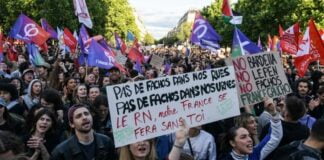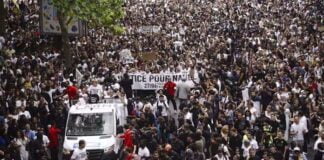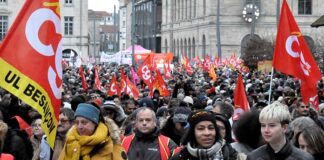Around 200,000 people took part in demonstrations across France on 1 May as the battle continues against President Emmanuel Macron’s neo-liberal assault.
Rail workers are striking two days in every five, fighting privatisation, line closures and the abolition of their contract which prevents mass redundancies.
Pierre Brun, a rail worker, said, “We had a good demonstration in Lyon, 8000 or so. It felt strong and united. Lots of different workers were on the streets with us.
“The number of train drivers on strike doesn’t go down. Some people miss a strike or two, others come out.
“But the issue is how we’re going to win. There has to be something that paralyses the country—a general strike, and for more than one day. Macron is very determined. Gestures won’t win.”
On 14 May rail unions called for “a day without rail workers”. It was highly successful, with few services running. It also saw an escalation of militancy. Around 200 strikers from Paris Nord station invaded the SNCF rail management headquarters.
From Marseille, CGT union member Bernard said, “We struck and we blocked the road near the Saint-Charles station. Some people, strikers and supporters, occupied the tracks.
“The bosses brought in the police. But they couldn’t stop the occupation. All the trains were halted.”
The strikes need urgently to accelerate. Eight trade union groups have called a day of public sector strikes and demonstrations on 22 May.
Strikes are planned by rail, air and maritime transport workers, and in every level of education from nurseries to universities. Postal workers, firefighters, health workers, electricity and gas workers, refuse workers and many more will also strike.
Macron wants to eliminate 120,000 public sector jobs and introduce individualised “payment by results” for workers.
Occupations
Meanwhile the student movement continues to resist Macron’s plan to increase selection and make it harder to go to university—despite police attacks on occupations.
In April police attacked and evicted occupying students at the Sorbonne university in Paris. This was the campus where 50 years ago students in revolt helped to spark the famous general strike in May 1968.
Protests in response meant the university was closed for two days. It’s one sign of the boiling political atmosphere in France.
Police have cleared out occupying students in Nantes, Bordeaux, Paris, Lille, Caen, Dijon, Grenoble, and Strasbourg. There were dozens of arrests.
Sylvine, a student from Paris, explained, “The movement is not intimidated, we’re angry. There are thousands of young people involved—against selection, with the strikers, against the new laws that crackdown on asylum.
“There were lots of students on the demos last week. In 1968 when the students were attacked the unions called strikes. We want that now—for themselves and for us.”
By Charlie Kimber
Socialist Worker UK





